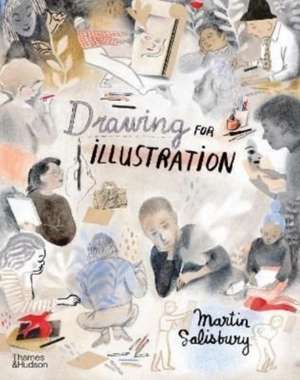Drawing for Illustration
Autor Martin Salisburyen Limba Engleză Hardback – 18 aug 2022
From book illustration to graphic novels and caricatures to commercial design, this attractive volume draws on sketchbooks, projects, and historical examples to show how they started as drawings from observation and drawings from imagination.
Salisbury starts out by explaining the fundamentals of this exciting discipline before outlining the basic principles of line, tone, composition, and color through inspired examples. Different approaches to drawing, including anecdotal, sequential, and reportage, are examined to help students acquire their own personal visual language. Interviews with illustrators also provide valuable insights into the creative process, as they discuss the challenges, rewards, and what drawing personally means for them.
Visually appealing, Drawing for Illustration features detailed analysis of works by key illustrators from the past and present, including George Cruikshank, Henri de Toulouse-Lautrec, Ronald Searle, Sheila Robinson, Laura Carlin, Alexis Deacon, and Isabelle Arsenault, looking at the differing roles drawing plays in their particular illustrative languages and how styles have changed over time.
Preț: 184.17 lei
Preț vechi: 211.14 lei
-13% Nou
Puncte Express: 276
Preț estimativ în valută:
35.24€ • 36.80$ • 29.10£
35.24€ • 36.80$ • 29.10£
Carte disponibilă
Livrare economică 26 martie-09 aprilie
Livrare express 11-15 martie pentru 94.34 lei
Preluare comenzi: 021 569.72.76
Specificații
ISBN-13: 9780500023310
ISBN-10: 050002331X
Pagini: 240
Ilustrații: 245 Illustrations, color
Dimensiuni: 224 x 280 x 30 mm
Greutate: 1.31 kg
Editura: Thames & Hudson
ISBN-10: 050002331X
Pagini: 240
Ilustrații: 245 Illustrations, color
Dimensiuni: 224 x 280 x 30 mm
Greutate: 1.31 kg
Editura: Thames & Hudson
Notă biografică
Martin Salisbury is Professor of Illustration at the Cambridge School of Art, where he leads the renowned MA Children's Book Illustration programme. He has previously chaired the international jury at the Bologna Children's Book Fair and been a member of the jury at the Global Illustration Awards in China. His books include Children's Picturebooks: The Art of Visual Storytelling (2012), The Illustrated Dust Jacket: 1920-1970 (2017, Thames & Hudson) and Miroslav Sasek in the Illustrators series (2021, Thames & Hudson).
Cuprins
Introduction
1. Drawing and Illustration
Drawing: what is it?
Illustration: what is it?
Drawing and Me: Isabelle Arsenault
Knowing through drawing: the education of the illustrator
Born' or 'True'?: Edward Ardizzone and Lynton Lamb
2. The Basics
Observation: learning to see
Tools and materials
Line
Tone
Using line to suggest tone
Mark-making and printmaking, Christopher Brown
Composition and structure
Perspective
Drawing and colour, Vyara Boyadijieva
People and environments
Drawing animals
Drawing and photography
Tools and materials
3. From observation to Imagination: Making the links
Drawing from memory, Yann Kebbi
Simon Bartram: Monday Man
Bill Bragg: Making the links
Sketchbooks/ visual journals
John Vernon Lord: The journals
Sally Dunne: Sketchbooks and me
Alexis Deacon: Drawing, thinking and the psychology of 'finished'
4. Drawing and applied illustration
Editorial/ magazine illustration
- David Humphries: Newton's Cradle or 'The biggest hum'
Book Illustration
- Evelyn Dunbar
- Pablo Auladell: La Feria Anbandonada
Character development
- Fifi Kuo
- Ellie Snowdon
- Axel Scheffler: The evolution of a personal visual language
Atmosphere and fantasy
- Victoria Turnbull
- Sheila Robinson
Authorial graphic storytelling
- Isabel Greenberg
- Jon McNaught
Advertising and display
- Kerry Lemon
- Frank Newbould
Humour
- Paul Slater
Reportage and graphic commentary
- David Hughes: Covid Diary
- Robert Weaver
- John Minton: Reportage for advertising
Illustration and photography
5. Postscript: A word about Style
1. Drawing and Illustration
Drawing: what is it?
Illustration: what is it?
Drawing and Me: Isabelle Arsenault
Knowing through drawing: the education of the illustrator
Born' or 'True'?: Edward Ardizzone and Lynton Lamb
2. The Basics
Observation: learning to see
Tools and materials
Line
Tone
Using line to suggest tone
Mark-making and printmaking, Christopher Brown
Composition and structure
Perspective
Drawing and colour, Vyara Boyadijieva
People and environments
Drawing animals
Drawing and photography
Tools and materials
3. From observation to Imagination: Making the links
Drawing from memory, Yann Kebbi
Simon Bartram: Monday Man
Bill Bragg: Making the links
Sketchbooks/ visual journals
John Vernon Lord: The journals
Sally Dunne: Sketchbooks and me
Alexis Deacon: Drawing, thinking and the psychology of 'finished'
4. Drawing and applied illustration
Editorial/ magazine illustration
- David Humphries: Newton's Cradle or 'The biggest hum'
Book Illustration
- Evelyn Dunbar
- Pablo Auladell: La Feria Anbandonada
Character development
- Fifi Kuo
- Ellie Snowdon
- Axel Scheffler: The evolution of a personal visual language
Atmosphere and fantasy
- Victoria Turnbull
- Sheila Robinson
Authorial graphic storytelling
- Isabel Greenberg
- Jon McNaught
Advertising and display
- Kerry Lemon
- Frank Newbould
Humour
- Paul Slater
Reportage and graphic commentary
- David Hughes: Covid Diary
- Robert Weaver
- John Minton: Reportage for advertising
Illustration and photography
5. Postscript: A word about Style
